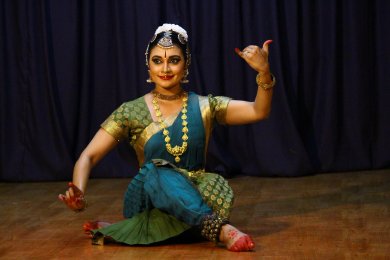 |
 |
Captivating recital by Divya Ravi October 24, 2016  Divya Ravi is a senior disciple of Dr. Soundarya Srivathsa and received
initial training from Gurus Kiran Subramanyam and Sandhya Kiran. She
gave a captivating and graceful recital under the auspices of Kartik
Fine Arts in Narada Gana Sabha, Chennai, on 14th October 2016. The
performance commenced with a Sankeerna Alarippu which gave a good start
to the recital. This was followed by a Saraswati shlokam in Kalyani
ragam. Divya Ravi is a senior disciple of Dr. Soundarya Srivathsa and received
initial training from Gurus Kiran Subramanyam and Sandhya Kiran. She
gave a captivating and graceful recital under the auspices of Kartik
Fine Arts in Narada Gana Sabha, Chennai, on 14th October 2016. The
performance commenced with a Sankeerna Alarippu which gave a good start
to the recital. This was followed by a Saraswati shlokam in Kalyani
ragam.Divya then took up the piece de resistance, the Varnam "Angayarkanni anandam kondale" in Navaragamalika, adi talam, one of the masterpieces of the violin maestro Lalgudi Jayaraman. Divya's prowess and mastery over nritta, nritya and natya came to the forefront in the delineation of the varnam. The portrayal of navarasas began with veeram, showing the valour of Angayarkanni as a nimble princess in the lines "Disaiyengum vendru vetri vaagai choodinale, aniveerargal ratha gaja thuragamudan." Next came the interpretation of sringara rasa in the lines "Nangai Kailai naathan..." when Parvathi expresses her desire to wed Lord Shiva, followed by adbhutam where Parvathi is astonished as she witnessed Shiva reducing Manmatha and the Tripuras to ashes. After this was the representation of hasyam in the lines "Kaikotti siritthal, vaipotthi nagaithal" showing Parvathi laughing at Shiva disguised as a labourer. Then followed other rasas, prominent of which was roudram in Atana ragam depicting the annihilation of the demon Bhandasuran by Mahakali in the lines "Mahakali Kapalini Trishoolini Simhavahini...." The piece ended with the lines "Shantaswaroopini sharanam Amma" seeking shantam and praying for peace in the world. The jathis were executed with immaculate precision. The araimandi poses with delectable tattu mettus were a delight to watch, for the connoisseurs and critics alike. Divya's dance was full of grace and her angashuddham and adavushuddham were richly transparent. Following the varnam was Jayadeva's ashtapadi "Sakhi he kesi mathana," where Radha recollects how she met Krishna and reminisces other sweet memories they shared. She tells her Sakhi about the abundant love she holds for her hero Krishna, and requests her to bring him to her. The abhinaya for this piece was exquisite and the sancharis were very beautifully portrayed by Divya. Next, the interesting, evergreen javali of Dharmapuri Subbaraya Iyer in Kaapi – "Parulanna maata namma vaddu prananayaka" was convincingly brought before our eyes. Here, the heroine tells her husband not to give credence to the words of others, that she has been having an affair with someone else. The abhinaya for the lines "Momu chinna poyinadi marmamemi ra" was very interesting. The sanchari for the subsequent lines "Mandayane yavaru neeku mundu pette ra" where the heroine asks the hero 'Which woman has drugged you?' and "Mundu delpu ippudo movi..." implying 'What has that woman done to bring about a change in your countenance?' was delightful when Divya essayed the same. She concluded her recital with a thillana in Madhuvanti by Lalgudi Jayaraman. It was a pleasure to watch Divya's exuberant nritta throughout the thillana. The recital was embellished by recorded vocal support of Kaniyal Hariprasad for the ashtapadi and D.S. Srivathsa for the rest of the pieces, percussion by Srihari Rangaswamy, mellifluous violin by Madhusudan and flute by Mahesh Swamy. Cymbals were wielded by Guru Soundarya Srivathsa and Karthik Dattar effectively. The audience left with the impression that Divya Ravi is an excellent upcoming artiste with immense promise for a very bright career. With more opportunities coming her way, she will go places. |